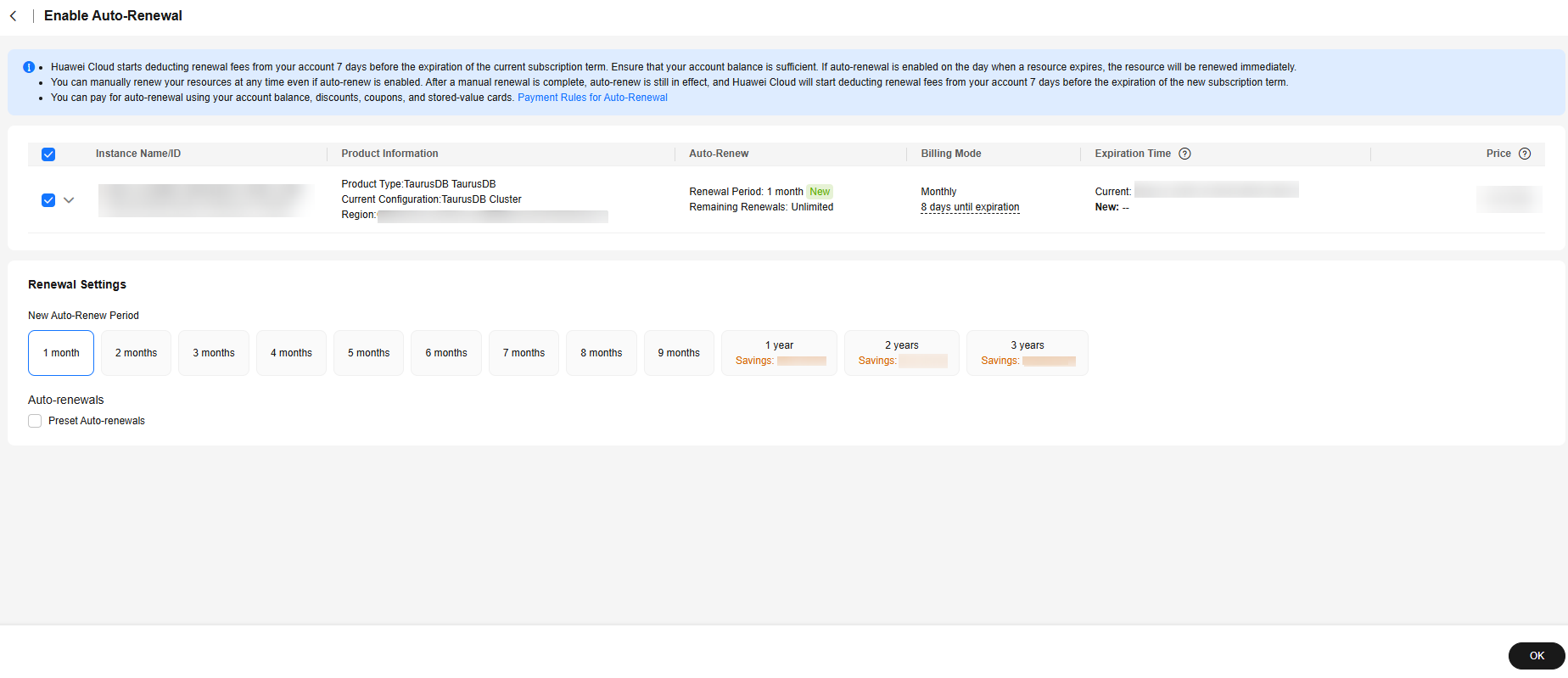Auto-renewing a DB Instance
Auto-renewal can prevent DB instances from being automatically deleted if you forget to manually renew them. The auto-renewal rules are as follows:
- The first auto-renewal date is based on when the DB instance expires and the billing cycle.
- The auto-renewal period of a DB instance depends on the subscription term.
- Monthly subscriptions renew each month.
- Yearly subscriptions renew each year.
- You can enable auto-renewal any time before a DB instance expires. By default, the system will make the first attempt to charge your account for the renewal at 03:00 seven days before the expiry date. If this attempt fails, it will make another attempt at 03:00 every day until the subscription is renewed or expires.
- After auto-renewal is enabled, you can still renew the DB instance manually if you want to. After a manual renewal is complete, auto-renewal is still valid, and fees start to be deducted seven days before the new subscription expires.
- By default, the renewal fee is deducted from your account seven days before the new expiry date. You can change this auto-renewal payment date as required.
For more information about auto-renewal rules, see Auto-Renewal Rules.
Prerequisites
The yearly/monthly DB instance is not expired.
Enabling Auto-Renewal During Purchase
You can enable auto-renewal on the Buy DB Instance page, as shown in Figure 1. For details, see Buying a DB Instance.

Enabling Auto-Renewal on the Renewals Page
- Log in to the console.
- On the top menu bar, choose Billing > Renewal.
The Renewals page is displayed.
- Select the search criteria.
- On the Auto Renewals page, you can view the DB instances that auto-renewal has been enabled for.
- You can enable auto-renewal for DB instances on the Manual Renewals, Pay-per-Use After Expiration, and Renewals Canceled pages.
Figure 3 Manual Renewals Figure 4 Auto Renewals
Figure 4 Auto Renewals
- Enable auto-renewal for yearly/monthly DB instances.
- Enabling auto-renewal for a single DB instance: Locate the instance that you want to enable auto-renewal for and choose More > Enable Auto-Renewal in the Operation column.
Figure 5 Enabling auto-renewal for a single DB instance

- Enabling auto-renewal for multiple DB instances at once: Select the instances that you want to enable auto-renewal for and click Enable Auto-Renewal above the list.
Figure 6 Enabling auto-renewal for multiple DB instances

- Enabling auto-renewal for a single DB instance: Locate the instance that you want to enable auto-renewal for and choose More > Enable Auto-Renewal in the Operation column.
- Select a renewal period, specify the auto-renewal times, and click OK.
Figure 7 Enabling auto-renewal

Feedback
Was this page helpful?
Provide feedbackThank you very much for your feedback. We will continue working to improve the documentation.See the reply and handling status in My Cloud VOC.
For any further questions, feel free to contact us through the chatbot.
Chatbot






